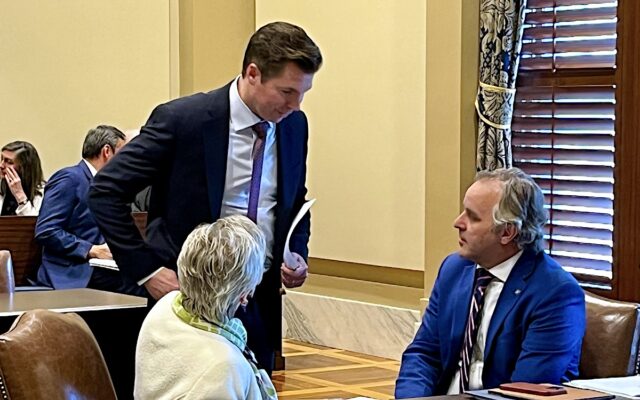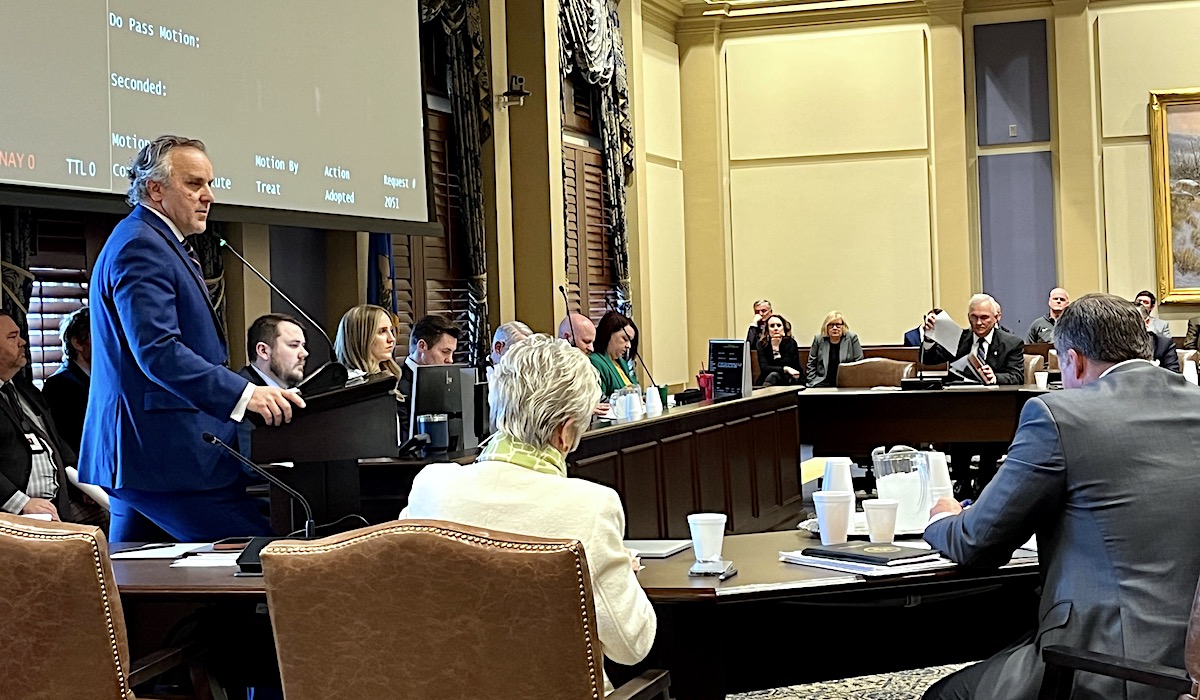

In a pair of Senate committee meetings this afternoon, senators amended and advanced the House education proposals of HB 2775 and HB 1935, in defiance of House Speaker Charles McCall, who previously said the package needed to be heard without changes by the upper chamber.
HB 1935, which proposes refundable tax credits for private school and homeschool families, advanced along party lines out of the Senate Education and Finance Committees. HB 2775, which proposes a $530 million increase for public education funding, advanced with some bipartisan support out of the Senate Education and Appropriations Committees.
“We’ve had meetings over the last three weeks, ad infinitum, to try to get to where we’re at,” Senate President Pro Tempore Greg Treat said after the bills advanced. “So I want to applaud these senators that stand up here with me today, and I hope that we can get this all to the finish line.”
Treat (R-OKC), along with Senate Education Committee Chairman Adam Pugh (R-Edmond), co-authored the bills in the Senate. Last week, Treat held individual and small-group meetings with his GOP Caucus members regarding the education package.
“[We] took meetings with superintendents and school leaders and teachers,” Pugh said after the bills advanced. “We heard from them, and we tried to line by line address what their needs were — what their challenges were in the classroom. And I think, in the end of the day, what the Senate can say today is we value education.”
Senate ups teacher pay proposal, adjusts tax credit numbers

As originally authored by McCall (R-Atoka) and passed with broad support from the House Republican Caucus, HB 2775 proposed an additional $150 million to fund a mandatory $2,500 teacher pay raise and an additional $300 million for public school districts that “basically can be used for anything within the academic realm,” according to McCall. An additional $50 million was proposed to address funding disparities for poorer districts through the Redbud framework created last year.
The House’s version of HB 1935 set the amounts for the proposed refundable tax credit at $5,000 per child for a private school family and $2,500 per child for a homeschool family.
With Treat’s amendments Monday, senators swapped the $2,500 across-the-board teacher pay raise proposed by the House with a stair-stepped teacher pay raise that would provide greater increases for longer-tenured teachers. The steps include:
- A $3,000 raise for educators with four years or less of experience;
- A $4,000 raise for educators with between five and nine years of service;
- A $5,000 raise for educators with between 10 and 14 years of service;
- A $6,000 raise for educators with 15 or more years of service.
Notably, the Senate’s version also includes a mechanism for merit-based teacher pay bonuses administered at the local district level. Senators also added funding-formula reforms to the pot of money intended to increase per-pupil expenditures that are not tied to teacher pay.
“There’s some merit pay in it. We’ve also adjusted some of the weights. Sen. Pugh has looked at adjusting some of the weights to make sure we are getting the money into areas of the schools that are going to make a difference for kids,” said Senate Appropriations and Budget Chairman Roger Thompson (R-Okemah). “So whether that’s reading specialists or whatever it’s going to be — transportation rates have also been adjusted, and we need that.”
Regarding merit pay, the bill would create the Rewarding Excellent Educators Grant Program allowing school district boards, with approval from the State Department of Education, to set guidelines for a merit-based pay schedule for teachers in their district. HB 2775 would appropriate $30 million for the program.
If it becomes law, the program could be seen as a win for State Superintendent of Public Instruction Ryan Walters, who asked for a merit-based teacher pay raise in his budget proposal to the Legislature last month. Gov. Kevin Stitt has also championed the idea.
“It does dovetail well with what [Walters] has set out as a priority,” Treat said. “We just haven’t discussed (with Walters) about this particular bill.”
In what would also be a significant expansion of school choice policy in Oklahoma, the amended version of HB 1935 still proposes the so-called “Oklahoma Parental Choice Tax Credit Act,” which would offer parents refundable tax credits for homeschooling their children or for sending them to private schools.
Senators increased from $5,000 to $7,500 the refundable tax credit for a child enrolled in a private school, and they dropped from $2,500 per child to $1,000 total for families who homeschool their children.
Senators also added a tax credit eligibility requirement to HB 1935. Only students in families who make less than $250,000 per year qualify for the refund, effectively excluding the state’s wealthiest families from taking advantage of the refund. The House’s version of the bill had no eligibility requirements.
“By putting the income limit, we were able to raise the value of the tax credit for private schools in order that people who could least afford it can now afford it,” Treat said.
Senators also took out trigger language in HB 1935 that would have nullified the bill if the Legislature failed to fully fund the HB 2775 appropriation. Treat said that his members did not feel that rule was “appropriate.” However, HB 1935 is still tied to HB 2775 in that if both bills must become law to take effect.
“In conversations with members over the last six weeks, that was deemed to be pretty cumbersome and not desirable,” Treat said. “The cumbersome part is if you get a child who is excelling in a private institution and then we have a one percent revenue failure to completely yank away that opportunity was deemed inappropriate.”
The Senate’s changes to the two bills dropped the overall fiscal impact estimate from about $800 million to about $630 million.
Hicks: ‘I think this is a misstep’
The Senate changes to the bills could pose a problem in the House, as McCall tried to give an ultimatum to his counterparts earlier this month. Saying the two bills must be heard “as is,” McCall said that any Senate amendments would “kill” the legislation.
That sentiment landed poorly with senators.
“We have to do what we believe in the Senate to be right and what is good for the people of Oklahoma,” Thompson said of McCall’s ultimatum. “We certainly appreciate the work the House has done by starting the conversation, but we just want to make it workable.”
It is unclear how McCall will react to the amended bills, but Treat said he had talked with the speaker about them.
“The speaker is still reviewing the amendments,” said House Republican communications director Daniel Seitz.
After the bills advanced, House Education Appropriations and Budget Chairman Mark McBride (R-Moore) said he would stand behind McCall as the House prepares to consider the Senate’s amendments.
“I still support the speaker’s plan, and if he wants to negotiate with the Senate I’ll support that as well,” McBride said.
As senators discussed HB 1935, Democratic senators took issue with the lack of state standards for private schools.
Treat replied with a common refrain among school choice proponents.
“I have ultimate belief that parents know best and will do what’s best for their children,” Treat said.
Sen. Carri Hicks (D-OKC) closed her debate against HB 1935 by calling the proposed tax credit a “misstep.”
“Struggling schools mirror struggling communities. Oklahoma legislature has ignored the urgent need to address the 60 percent of Oklahoma’s children who live in poverty in our public schools,” Hicks said. “When we are looking at removing additional funding that could be invested in all of our kids’ futures — I think this is a misstep.”




















